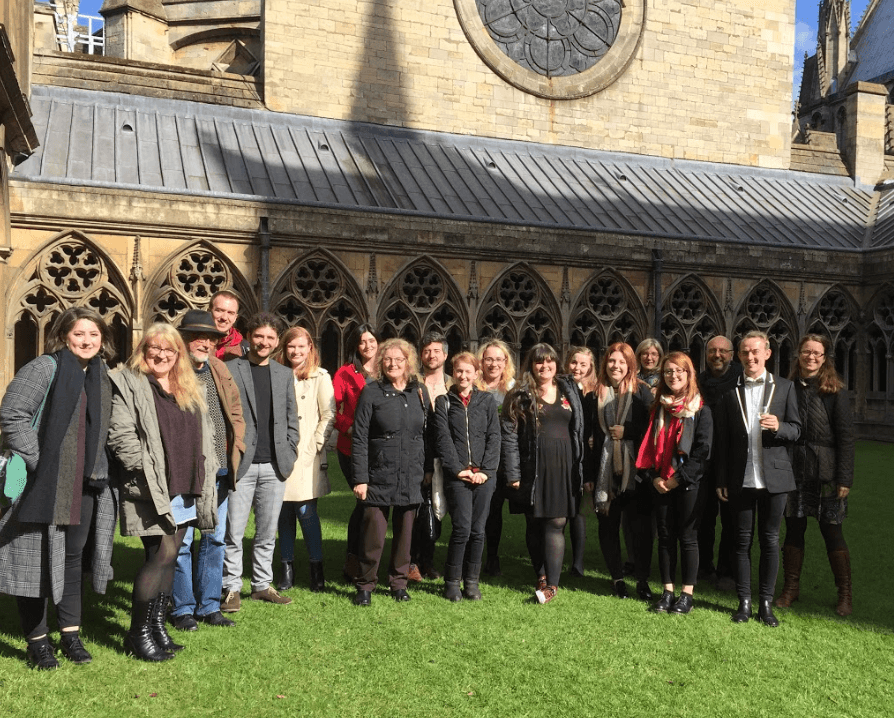Funding a Masters Programme.
Undertaking postgraduate study can be a rewarding experience that will help you stand out from the crowd when applying for jobs in your future career. However, it is also a large financial undertaking, with various factors to consider. How will you pay your tuition fees, rent and other living expenses? These all need to be considered when applying for an MA, and you will likely be asked about this during your interview. [link to interview post here]
But don’t panic! We’ve composed an introduction to funding your postgraduate studies. Below are a list of ways our current students help support themselves whilst studying.
Student Finance Postgraduate Loan
 Student loans of £10 280 are currently available for postgraduate study through the Student Loans Company. This is paid back in the same way as the undergraduate loan. However, it is not means tested unlike the undergraduate loans, so if you are eligible you can claim the full amount on offer to you. For most students, this will provide a significant contribution towards study costs and living expenses.
Student loans of £10 280 are currently available for postgraduate study through the Student Loans Company. This is paid back in the same way as the undergraduate loan. However, it is not means tested unlike the undergraduate loans, so if you are eligible you can claim the full amount on offer to you. For most students, this will provide a significant contribution towards study costs and living expenses.
Applications for this loan usually open up during the summer, so follow https://www.gov.uk/student-finance and social media platforms linked at the end of this blog to see when applications are open.
For a more in-depth look at PG student you can read all about them at https://www.gov.uk/masters-loan/.
Part-Time Employment
As well as a Postgraduate loan, many students use part-time employment to fund their studies. This year, we’ve had students taking all kinds of jobs, ranging from website designers to artists, bankers to teachers, and many more to help cover the costs of studying a Masters programme. Whilst this isn’t a necessity for everyone, it can be a helpful way to earn money and also gain valuable work experiences, references and connections for when you finish your degree.
It is worth mentioning that it is important to balance your work commitments with study time and timetabled teaching on your masters. If you’re unsure of contact hours, or your timetabling is not yet available, it is worth getting in touch with staff to find out how this is usually conducted. At Lincoln, teaching on the English masters programmes takes place on Wednesdays, leaving the rest of the week free for work commitments; however, this isn’t always the case for all universities so check with your chosen institution for more information. The recommended number of hours for part-time employment while studying full-time as a PG student is from 12-15 hours per week. Some students might work more, depending on their needs or working habits, but remember that full-time study will require at least 35 hours of your time each week.
Scholarships, Research Councils and Study Grants
Scholarships may be offered by your university or a sponsor; check with your chosen institution for more information on what financial support is available. You can find out more about Lincoln’s scholarships and study grants here.
Research Councils offer funds to those undertaking postgraduate studies; you can find out more about this here https://www.ukri.org/funding/ . However, funding is competitive and usually reserved for doctoral level study, so this should not be relied upon as a means of funding your degree.
Bursaries may also be available for programmes such as teaching training, social work and NHS-related programmes such as nursing. These may be provided by the government, private companies or your institution. It is worth researching to see if additional bursaries or study grants are available for your chosen programme.

Many students use public transport, such as buses and trains to commute to university. It is worth seeing what kinds of passes and discounts (such as the 16-25 railcard) you are eligible for as a postgraduate student.
Commuting to University
Alongside budgeting, some students live at home with family and commute during their postgraduate study. This can relieve
some of the living expenses associated with postgraduate study and can be cheaper than renting a property in some university cities. Unlike the undergraduate student loan, commuting and living at home will not affect the amount of funding you receive, you will still be eligible for the full loan of £10 280 should you wish to take it. One of the benefits of living in Lincoln (versus universities in larger cities) is the overall lower cost of living and the ease with which one can walk around the city (so no transit costs if you live in town!).
Budgeting is key!
Once you have secured your funding, it is important to make sure you budget what money you have to cover your expenses throughout the year. Some universities will offer payment plans for your tuitions fees to coincide with student finance payments; however, not all universities will offer this so it is important to make sure you can pay fees when they are expected and still have enough money for rent and other living expenses.
For more information on funding postgraduate see:
Gov.uk’s guide to funding Postgraduate Study and the Masters loan.
For advice on funding and budgeting see:

Sites such as MoneySavingExpert.com have lots of tips and tricks for how to save money and budget effectively.
Money Saving Expert for information for student funding guides and other tips and tricks to stretch your budget further.
It is also worth speaking to the careers and finance department(s) at your university for more specific funding advice.









